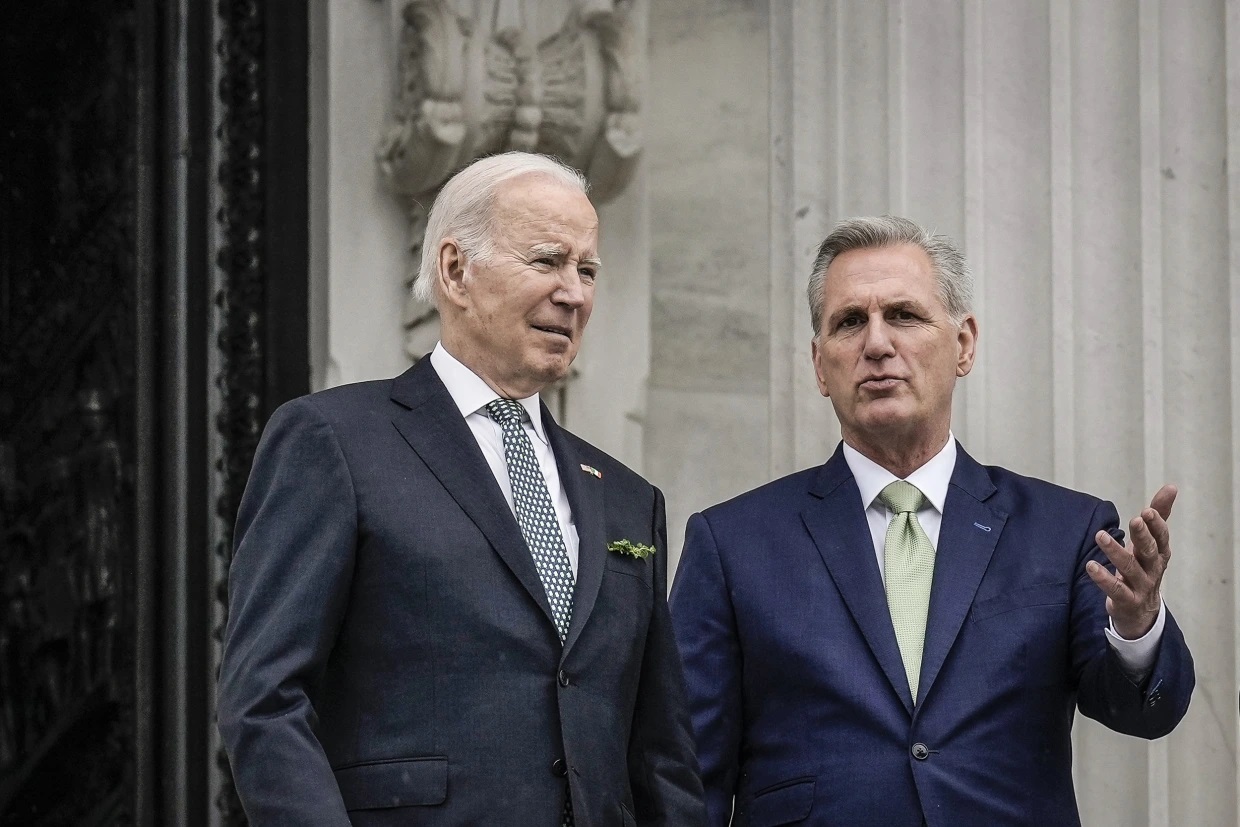During the weekend after the stunning collapse of California’s Silicon Valley Bank, no one from the White House or the Biden administration called House Speaker Kevin McCarthy — the most influential politician from California, as well as the most powerful Republican in Congress.
McCarthy checked in with Federal Reserve Chairman Jerome Powell, as well as his committee chairmen and his Democratic counterpart, Minority Leader Hakeem Jeffries of New York. And rather than wait by the phone for a call, McCarthy said he dialed up Treasury Secretary Janet Yellen. They wound up talking that Saturday in the first of “multiple” conversations, a Treasury Department spokesperson said.
But he didn’t connect with any top White House officials over the weekend as Silicon Valley Bank and then Signature Bank failed, prompting fears that a contagion could spur a broader bank run and a financial crash.
“I never had somebody from the White House reach out to me. Not one person from the administration called me; I called them,” McCarthy recounted to reporters last week at the annual House GOP retreat in Orlando, Florida.
The Biden administration scoffs at the idea that McCarthy is being neglected. Putting aside the recent bank failures, an internal White House memo shows that Biden has reached out to McCarthy again and again, calling him on his birthday and on his becoming speaker. If anything, the White House says, Biden might be the spurned suitor: McCarthy didn’t visit the building once in 14 months in 2021-22, even though he had been invited repeatedly, a White House official said. Overall, the White House has invited McCarthy to visit more than 20 times; he went eight.
No one expects grand legislative breakthroughs in a period of divided government and heightened polarization. But when the president and the House speaker are barely on speaking terms, the more relevant question is whether they can stave off a financial calamity. In the coming months, Biden and McCarthy will need to strike a compromise to keep the country from defaulting on its debt, and in the fall they’ll need another agreement to keep the government from shutting down.
No meaningful negotiations are underway, and no deal is in sight. The deadline to avoid a catastrophic default, according to the Treasury Department, is June 5.
McCarthy and the Republicans demand that deep spending cuts be tied to any increase in the debt ceiling — a position McCarthy agreed to to win backing from the far-right Freedom Caucus to become speaker. Biden has insisted on a clean debt ceiling hike not linked to any spending cuts. Their first and only White House meeting, on Feb. 1, yielded no breakthrough; the two haven’t met to discuss the issue since then.
McCarthy said that at a St. Patrick’s Day lunch in the Capitol, he pointedly asked Biden when the two could sit down again and start negotiating. Biden, seated next to him, replied with a familiar refrain, McCarthy recalled: Where’s the Republican budget?
At an Orlando resort last week, McCarthy’s growing frustration was evident. He complained to reporters that Biden was being stubborn. And Tuesday, he fired off a letter to Biden, arguing that the president’s refusal to negotiate on “out-of-control spending” was jeopardizing the fragile economy.
McCarthy insisted that Biden’s team reach out by the end of the week to set up a meeting.
“[Y]ou and your team have been completely missing in action on any meaningful follow-up to this rapidly approaching deadline,” McCarthy wrote, a message he reiterated in interviews with reporters later in the day.
“Your position — if maintained — could prevent America from meeting its obligations and hold dire ramifications for the entire nation.”
McCarthy’s letter included a handful of general ideas to tackle the $31.5 trillion national debt, including reclaiming unspent Covid funds, strengthening work requirements for some government programs and cutting nondefense spending to pre-inflationary levels. But his lack of specifics also highlighted the fact that, weeks after Biden rolled out his spending blueprint, House Republicans have yet to put forth their own budget document for the next fiscal year.
In reply to McCarthy’s letter, the White House dug in. Speaking to reporters Tuesday before he left North Carolina, where he’d given a speech, Biden was asked whether he planned to meet with McCarthy if he doesn’t put forward a budget proposal.
“Well, I don’t know what we’re gonna meet on,” Biden said.
Republicans said Biden’s focus on a GOP budget is about political gamesmanship given that House Democrats didn’t produce a traditional budget when they were in power.
“Democrats didn’t produce one for the last four years. They never passed one out of the Budget Committee. They would ‘deem’ their budget every year. So now we have to have a Republican budget?” asked Rules Committee Chairman Tom Cole, R-Okla., a senior appropriator and close McCarthy ally. “That didn’t seem to stop President Biden when he was working with a Democratic Congress. He didn’t tell Nancy Pelosi: ‘I have to have your budget. You have the majority. We have to see your budget right now.’
“So this is all politics and political posturing, and it’s dangerous.”
That Biden appears in no rush to meet with McCarthy — three months before a potential debt default — suggests the White House believes it is playing a much stronger hand.
Top Democrats say that by keeping McCarthy at arm’s length and repeatedly needling him about the GOP’s failure to produce a budget blueprint, Biden is drawing attention to McCarthy’s precarious hold on his leadership position. With just a five-seat majority, McCarthy is trying to appease both conservative bomb throwers who are demanding drastic cuts and moderates in his conference who don’t want to see programs gutted.
Biden nodded to McCarthy’s predicament in an appearance at a Senate Democratic meeting this month. McCarthy is in an interesting spot, Biden said, to laughter from the lawmakers.
Rep. Brendan Boyle of Pennsylvania, the top Democrat on the Budget Committee, said in an interview Tuesday: “We have the facts and the math on our side. But I’ve also always had the view that given all of the various promises that Kevin McCarthy made in order to get elected speaker, it’ll be very difficult for him to come up with a budget that he could get 218 of his own members to vote for. And the fact that we haven’t seen it yet, I think, reflects that reality.”
A Republican on the Budget panel, Rep. Ralph Norman of South Carolina, who initially opposed McCarthy’s speaker bid and then later backed him, predicted the different factions of the GOP conference would be able to come together on a budget, although he conceded it wouldn’t be easy.
“We’ll present a budget. We’re going to present the debt-limit case. If [Biden] shuts the government down, it’s gonna be on the Biden administration — it won’t be on us,” Norman said in an interview. “There will be gnashing of teeth, but that’s a good thing.”
Biden and McCarthy barely speak, dimming prospects for a debt ceiling deal




